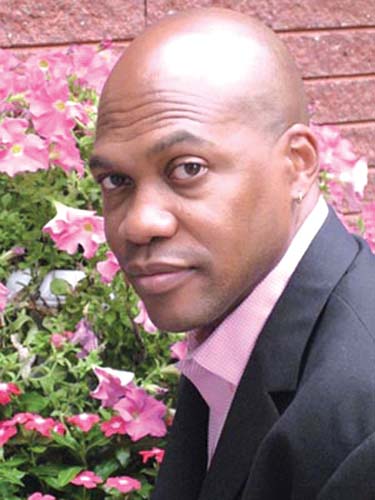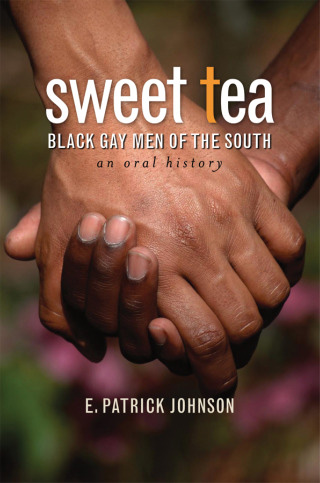E. Patrick Johnson is the author of Sweet Tea: An Oral History of Black Gay Men of the South, which consists largely of transcribed oral narratives. Johnson, the department chair of performance studies and a professor of African-American studies at Northwestern University, began researching the book in 2004. In October 2006, he began enacting solo performances and recreations of the narratives. The performances (called “Pouring Tea”) are now part of his current book tour. Windy City Times spoke to Johnson about his book; the accompanying performances and the lure of the South.

Windy City Times: In your introduction, you emphasize the fact that you didn”t approach this as a historian. How would you characterize the difference between your work and that of historians like John Howard [author of Men Like That: A Southern Queer History, about Mississippi gay history]?
E.Patrick Johnson: My book was meant to be a living archive of narratives of African-American gay men born and raised in the South. For me, it was important that it be an oral history, that it be about people essentially theorizing their own lives in the telling. In that way my approach was a little different from a historian’s approach. I wasn’t necessarily interested in it from a scholarly perspective, in analyzing what they said or imposing a certain theoretical frame onto what they said as much as I was interested in documenting narratives and letting the theories speak through what was said. The other difference between my book and other such histories of the South is that I do the entire South.
WCT: What were those theories?
EPJ: For instance, in the narrative of Chaz/Chastity (a transgender person in Hickory, N.C.) : the ways in which Chaz narrates her life is a theorizing about the performativity of gender in a way that’s understandable and based on life experience, and in a way that Judith Butler [the feminist theorist who’s written on the performativity of gender] can’t explain it [Laughs]. We don’t have to go to post-structuralist theory; we can go to Chaz. That’s not to belittle Judith Butler’s work, but just to say that it’s a different way of accessing the performativity of gender—in a way that my mother could understand, for instance.
WCT: In your discussions about the cultural norms of the South, you write about how the South has a way of holding on to secrets. As you put it, that’s a part of “Southern gentility.” But is it also about maintaining power structures?
EPJ: Absolutely, it’s about hostility as much as gentility. [Laughs] The phrase “governing with a steel fist in a velvet glove” [comes to mind]. The dominant discourse in much of the South is a religious discourse; it pervades every aspect of Southern life. So if one’s intention is to have it both ways—to maintain the veneer of religious piety yet be able to partake of the flesh—then one must not speak of those things that might go against the grain of the predominant religious discourse. So that’s why you have, particularly in the church—and not just the Black church of the South—all kinds of transgressions, all kinds of hypocrisy that transcend sexual orientation. There are just as many heterosexuals participating in that [kind of hypocrisy] .
[Southern gentility] is absolutely about maintaining and sustaining certain power structures. But that same power structure provides opportunities for sexual dissidents to use it to their own advantage….Some people might ask, why stay? Why not go to a club? That’s what’s specific to the South. Those of us who are Black and gay and Southern started going to the church in the womb [laughs]. It’s a part of our blood. And so when we come into our sexual consciousness, we can’t just chop [the church] off. Because at the same time that it’s oppressive, it’s also liberating. Because especially when you are a kid, the culture of many Black churches is such that you can be the worst singer, the worst whatever, but they’ll encourage you. That kind of encouragement, in the context of all the other religious stuff, is a part of who you are. That sustains you in ways that other sexual venues can’t sustain you.
Now, that’s not the experience of everyone in the book. But many, especially those who’ve decided to stay in the church, find ways to reconcile the homophobic rhetoric of the church with their spirituality and sexuality.
WCT: That brings me to a popular trope through which many people understand Black gay male men who are not “out”—as living with the “down low syndrome.” How do you prevent people reading Black gay men staying in the church and not being as out [from seeing] another manifestation of the down-low culture?
EPJ: First of all, the down-low terminology and discourse [are] old. People think it came about a couple of years ago with J. L. King [author of On the Down Low]. But it actually emerged around heterosexuality: “Keeping it down low” referred to various indiscretions. Secondly, for as many men in Sweet Teawho are discreet about their sexuality, there are just as many who are open. Many of the men in the church are also flamboyant. They use the rituals and performance aesthetics of the Black church to express their sexuality. So a flamboyant queen can still be that flamboyant queen while directing the choir because it’s expected of him to be over the top. That has nothing to do with the down-low and more to do with people knowing that this person is gay but still not saying anything about it. It’s not like a secret in the same way as men who do identify as being on the down-low.
WCT: The performances that are now a part of your book tour started in October 2006. Did you think about performing these narratives when you conceived the book?
EPJ: No. When I got deep into the research and started conducting the interviews, I realized: This has to be a play. [Laughs] Sitting down with these folks and hearing them tell their stories in their unique ways suggested to me that the immediacy of the telling had to be recaptured in a way that reading it on a page would not. So I decided, after I’d done more than half of these interviews, that I would put together a performance based on these narratives.
What I didn’t know [at the time] was whether I would cast the show or if I would do it [as a solo performance] . It became a [set of] intellectual questions for me: What would it be like for the researcher to stage his ethnographic material? What are the politics around that? So, I began to think about how to frame this performance in a way that also staged this encounter. I’m still thinking through the politics of all this, but one of the things I decided that I didn’t want the show to be was a kind of Anna Deavere Smith show, to “become” these people. But I also didn”t want it to be a bland reading.
So I decided that it would just be me on a stool, with a music stand and the text. But I also wanted the men to be present. I decided I would play excerpts of the men’s interviews so that the audience actually heard them speak in their own voices. And then go into the performance, but also keep within the performance the questions that I asked them, so that the audience is always aware that this is a dialogue between Patrick and whomever he’s interviewing. I’m a performer and I’m interested in the relationship between theory and practice.
WCT: In that context, what does it mean to perform [Pouring Tea] , especially to mixed or primarily white audiences that might expect the usual stereotypical narratives of pathos and sadness ascribed to Black gay men?
EPJ: [You can never] overdetermine how an audience is going to react, and so I try not to do that. [Laughs] But what I do try to do is be very deliberate in the choices that I make in a performance that at least [convey] to the audience that I have thought of [how I construct the performance]. For instance, it’s not a coincidence that you hear the voices of the men speak [before the performance starts]. It’s not a coincidence that I’m just sitting on a stool with a music stand. All those things are deliberate. But still, there’s no way I can anticipate how that performance reinforces certain stereotypical notions about blackness, about sexuality, about the South. Inevitably, there are going to be people who come to the show [thinking] that all these men are down on their luck.
And those men are represented in the performance, but there are also men who defy those stereotypes. I don’t think people who come to the show thinking that everybody in the South is religious is prepared to hear Freddie talk about leaving the church and about how he couldn”t stay in the church and listen to homophobia. They are not prepared to hear from people like Duncan Teague who critiques heterosexuality and [talks] about comforting a straight man whose wife has left him, and about how he [Duncan] can go home to his lover of eleven years.
It’s tricky when you are performing this kind of material, but I think the risks involved in performing it are worth the cultural and social engagement that the performance produces.
WCT: How have the book and the performance shifted for you since the publication of the book?
EPJ: The book is what it is. But the performance is its own thing; it continues to morph; [it] gives the audience a three-dimensional perspective on the men in a way that the book doesn’t. The book is heavily edited…There are certain freedoms that I can have with the performances that I can”t have with the book. The performance keeps morphing and narrators are coming in and out; I don’t do all the same ones every time. Both the book and the performance have a life of their own.
WCT: Sweet Tea is mostly about men who don’t want to leave the South, but there are some who do leave. What pushes them to leave?
EPJ: I write about my own journey out of the South in the introduction: That even though I may leave it, it will never leave me. [Laughs] and I think thats true for even those who reject the ‘south and leave it behind. The South doesn”t leave them.
[And] then you have people who left because they felt too confined, wanted to experience queer culture with a capital “Q.”…There are some who feel, “I will never go back there because I don’t feel free.” They don’t want to participate in that passive aggression. They want to be in a place that allows them to be explicitly gay and not have to get shrouded in codes.
Originally published in Windy City Times, 3 December, 2009
